Watercolours of Thomas Bone
- Jon Ruwolt
- Jun 17, 2023
- 8 min read
Recently a Volunteer at Clare Museum discovered a watercolour shoved behind a cupboard with a broken frame and broken glass.

We took the watercolour to Blackman Gallery here in Clare and are delighted with the reframing. It looks fresh and is a lovely painting of a dam on the property “Inchiquin”.
In 1937 in the newspaper 'Northern Argus', Max Ragless comments:
"This painting. 'North Clare' is an unusual picture. In this painting Mr. Bone has made an attractive picture of a subject which other artists would pass by."
“Inchiquin” was the Clare home of Edward Burton Gleeson, the founder of Clare, he was Clares first Magistrate and first Mayor of Clare. The current mayor also lives there now.

Max Ragless also mentions (in 1937) -
"Mr. Bone held successful exhibitions of his watercolors in Melbourne and Adelaide this year and now the people of Clare and district are to be given the opportunity of viewing his latest work."
"He is recognised as a master of the watercolor medium and as some of the pictures (were) painted in the Clare district rank among the best he has produced, this latest exhibition should appeal strongly to all lovers of art in the district.

Mr. Bone's landscape work is distinguished by excellent draftsmanship, (his) rare choice of subject matter, and (his) remarkable effects of sunlight.
"He paints with normal vision, and all his work is sincere.
A striking quality about his pictures is the success which attends his painting of greens and sunlight.
Greens are a constant worry to most artists, but Mr. Bone seems to have mastered them, and he has also succeeded in capturing our Australian sunlight.
While the work throughout is excellent, special mention should perhaps be made of some outstanding pictures.

'Hughes' Park' is one of the most outstanding paintings. It is very lively, the composition is pleasing, the treatment bold and vigorous, the color clean, and the effect of sunlight most happily caught."
Other watercolours of Thomas Bone which caught the eye of Max Ragless were:
'Garden Scene — Weroona' is a gem. The subject is beautiful, the composition delightful, the color as pure as possible, and the effect of sunlight on the tree trunks truly remarkable.

'Early Morning' is also a delightful picture. The artist has caught the effect most effectively, with the blue, smoky haze of the distance and the sparkling sunlight in the foreground. The church building makes a pleasant note of color, and is a decided help to the composition.
The artist is at his best in 'The Wimmera (River) at Elmhurst' (below):

The best gum study in the exhibition is 'Hillside Gum.' This is indeed a fine study of a typically Australian subject.


Another very good gum study is 'The Giant Gum' which is also a typically Australian scene with the calves in the foreground forming a happy note.
Other pictures of gums worthy of special mention are: —
'White Gum Saplings',
'A Spring Morning',
'Gums on Mintaro Road' and

'Old Gum at Pewsey Vale.'

A very unusual and appealing picture is 'The Old Gateway.' In this the artist has shown his love for the commonplace, and his ability to extract beauty from the humblest of subjects.
'The Main Street, Clare,' shows the artist as a capable draftsman.
Other Pictures worthy of special mention are the powerfully painted
'St. Aloysius Church, Sevenhills'; and
'Wolta Wolta';
a dainty little sketch of the monastery grounds ;
'Lennon, Street, Clare',
'Sandy Creek' and the
'Torrens near Birdwood.'
Below: Slideshow of farmyard and rural subjects by Thomas Henry Bone
Click arrows (<, >) to change images
EXHIBITION OF WATER COLOR PAINTINGS AT CLARE.
WELL-KNOWN ARTIST.TO STAGE AN EXHIBITION IN THE CLARE INSTITUTE. THE ART OF THOMAS H. BONE.
All lovers of art will be pleased to learn that an exhibition of water color paintings by the well-known Australian painter, Thomas H. Bone, will take place in Clare at the Institute during the Annual Clare Week Celebrations.
We understand that the Clare Institute has been taken to stage the display and that Misses Joyce and Joan Pink will assist Mr. Bone to show the paintings, and will also be assisted by Mister Ian Tilbrook, whom he has taken under his wing to train and help in his art studies entirely free of cost.
A representative of this paper had an opportunity to see Mr. Bone at work last Sunday when a panoramic painting of the "Hummocks Ranges from the Spring Gully ridges" was executed, the weather and visibility of this Springtime of the year being most favorable to do the work.

Other paintings of the (Clare) town and district are of
Main Street, one of Neagle's Rock, the Stepping Stones,
St. Aloysius Church, Sevenhill, and numerous other landscape subjects.

Mr. Bone needs no introduction to the art loving public, but for the information of local people it may not be generally known that he has
been a member of the Royal South Australian Society of Arts since 1926,
a member of the Council since 1928, and
elected a Fellow of the Society in 1930.
He is also a member of the Victorian Art Society.
He won the gold medal at the Adelaide Centennial Exhibition in 1936 for the best exhibit of any kind in the fine arts section, and
two of his recent paintings have been acquired by the Bendigo Art Gallery and the National Gallery of South Australia, the latter being the one exhibited in the Royal S.A.-Society Art Exhibition of 1937.

Mr. Bone is regarded by the Director of the National Gallery (Mr. Louis McCubbin) as
one of the best men in South Australia;
by Mr. M. J. McNally, as being in the first flight of Australian painters in the water color medium; and
by Mr Hans Heysen, that his knowledge of paintings should help to place the future of art in this State on a sounder footing.
Mr. Bone studied under Mr. Arthur Woodward, of Bendigo, who trained Agnes Goodsir (Associate and gold medallist of the Paris Salon), and many others who have won distinction in Paris and, London art circles.
The Bendigo- "Advertiser" of Sept. 27th, says: —
"Bendigo's Art Success.—The National Art Gallery of Adelaide has just purchased one of Mr. Thomas H. Bone's landscapes in water colors from the South Australian Society of Arts Exhibition, entitled 'Mount Direction, from Amphitheatre.'

Of his work, much of a favorable nature has been written by the art critics of three States.
This year Mr. Bone, who is a native of Bendigo, and wholly trained by Mr.- Arthur T. Woodward, of this city, has held two shows of his pictures, the first in Melbourne and the second in Adelaide.
Only now in his middle thirties, Mr. -Bone, whose ancestors at home were famous painters,, a distance relative, Mr. Muirhead Bone, had a full-page picture of a Coronation scene in "The Times" last May, and has evidently found his way into the foremost rank of Australian water color painters.
His friends in Bendigo, as well as others, will congratulate him on his recent success.

LANDSCAPE CHARM
Thomas H. Bone's WaterColours (By C. G.)
The Bishop of Bunbury (the Rt. Rev. Leslie Knight) opened an exhibition of water-colours by the Adelaide artist, Thomas Bone, at the Claude Hotchip Galleries yesterday afternoon.
He paid a tribute to the artist's skill, and pointed out the developments in his work during recent years. A large attendance showed much interest in the Bishop's personal reminiscences of the artist.
Since Thomas Bone's last exhibition, he has been busy in Tasmania, the Riverina, elsewhere in Victoria and at Canberra. His shows in the Eastern States have been very successful, and the Federal Government has bought several of his pictures for exhibition abroad.
A variety of pleasing scenes gives some idea of the artist's skill and range of style.

The Tasmanian pictures show a solid brushwork, while the Riverina and Canberra pictures are painted in thin and pale washes, fading into the distance.
There is a hint of painting to formula here, but the clear light and breadth of view are very pleasing.

Several views of Melbourne are very well done in a conventional style.


A fine strong painting of Canberra and another of the Murrumbidgee River catch the eye


"Gums Grey Day" is a quiet harmony of great charm.

The general quality of the show is good, and the artist convinces us of the sincere and successful attempt to develop a style which will truly interpret the Australian landscape.
Exhibition Of Water Colors
By H. E. FULLER
The high reputation which Tom H. Bone has already gained as one of the leading water colorists in this State, if not in the Commonwealth, will be further enhanced by his display to be officially opened at the Royal SA Society of Arts Gallery tonight by Lady Napier.
Practically each of the 46 works on the wall displays careful attention to drawing and color, with out being meticulous, and this is particularly noticeable as regards the general draughtsmanship.
The range of subjects is a most comprehensive one, and includes scenes from most of the States. Bone has a flair for architectural effects, and among these should be noted
'St Patrick's Cathedral.,Melbourne.' excellent in drawing and color.
'St. Paul's Spires' and 'City in Mist' are also fine studies.

In 'Collins St' always a favorite subject with artists, there is again a large amount of capital drawing and relief in the form of colorful touches.
Adelaide Artist's Success
The trustees of the Queensland National Art Gallery have purchased "Melbourne's Broken Sky line," a watercolor by Thomas H. Bone, an Adelaide artist.
Mr Bone is now represented in five Australian art galleries, including the National Gallery of South Australia.
"Melbourne's Broken Skyline' was included in Mr. Bone's recent Adelaide exhibition. It was painted from the roof of the Royal Insurance Building, Collins street, Melbourne.

Melbourne's Broken Skyline' gives a realistic appearance or the city in quiet tones.
Some or the older parts of Melbourne provide splendid subjects for artists and 'A Bit of Early Melbourne' is delightful in drawing and color.
Very interesting too. is 'Continental Cafe.' ' with its touches of bright color and quite one of the best sketches for drawing and color is '25 Collins St., Melbourne.'
'Princes Bridge' may be noted for its composition and careful modelling
'The Fruit Shop' is a charming study.




No exhibition nowadays is complete without views of Flinders Ranges, and Bone has also visited there.

His color is true and effective, though restrained, and his drawing gives a right impression of the majesty and dignity or the massive hills and cliffs.


Below: Slideshow of Thomas Bone' picturesque artistry, some of Europe (click < or >)
Thomas Henry Bone Tribute
Full Name: Thomas Henry Bone (also known as Tom Bone, Thomas H. Bone, T. H. Bone)
Birthplace: Eaglehawk (Bendigo, Victoria)
Father: Albert Bone Mother: Harriett Bone (nee Willis) Grandfather (mother): Thomas Willis Grandfather (father): Henry Bone
Wife: Doris Alberta Bone (nee Davidson) Married: 1931
Children: 2 Daughters, Merna and Glenda
Father In Law: Mr H Davidson
Uncle: Mr T. Bone
Took ill on Wednesday while travelling from Adelaide to Melbourne.
Died: 1953, June 14th in Horsham, Victoria
Residence at time of death: 12 Dunstan Avenue, Kensington Park. Adelaide, South Australia
Buried: Enfield Memorial Park Cemetery, South Australia
Survived by Wife and two daughters, aged 13 and 18.
Funeral held Adelaide on Tuesday, 16th June 1953.
Received his art training in Victoria under Mr. Arthur Woodward.
In 1925 left his post as an art instructor in Victoria to make his home in SA
Won the gold medal award in the SA Centenary Exhibition for the best exhibit in the fine arts section. http://trove.nla.gov.au/newspaper/article/48257861
Above details from:




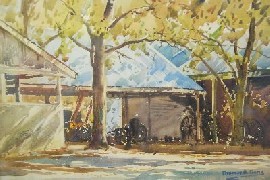











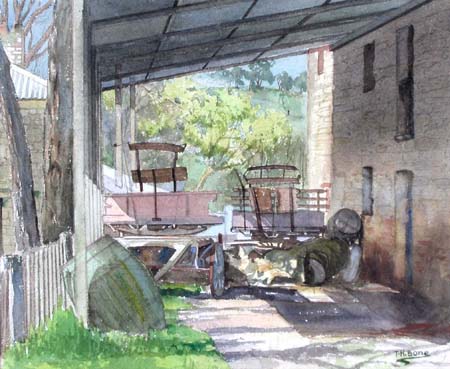

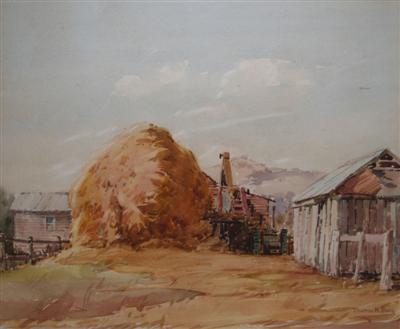

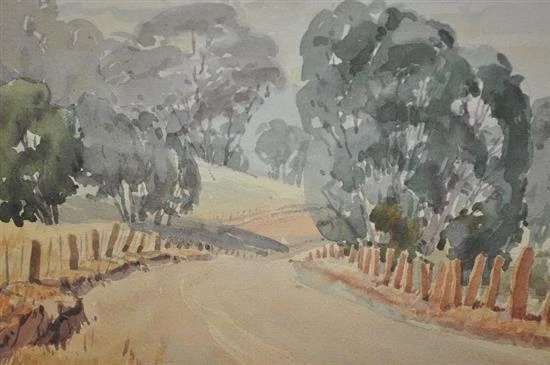












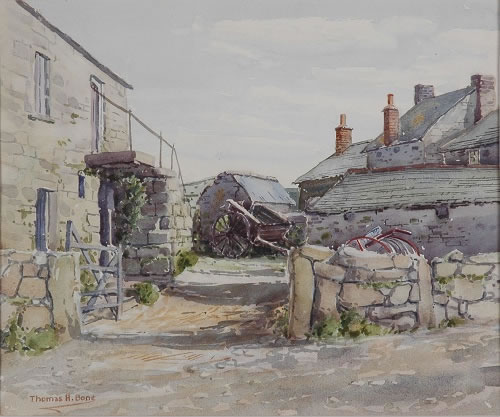

















Comments